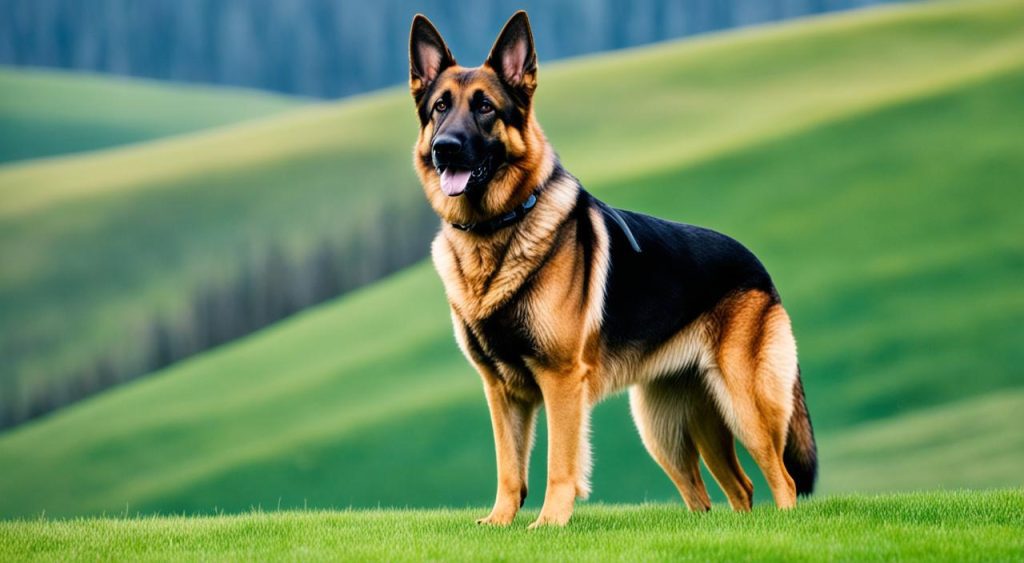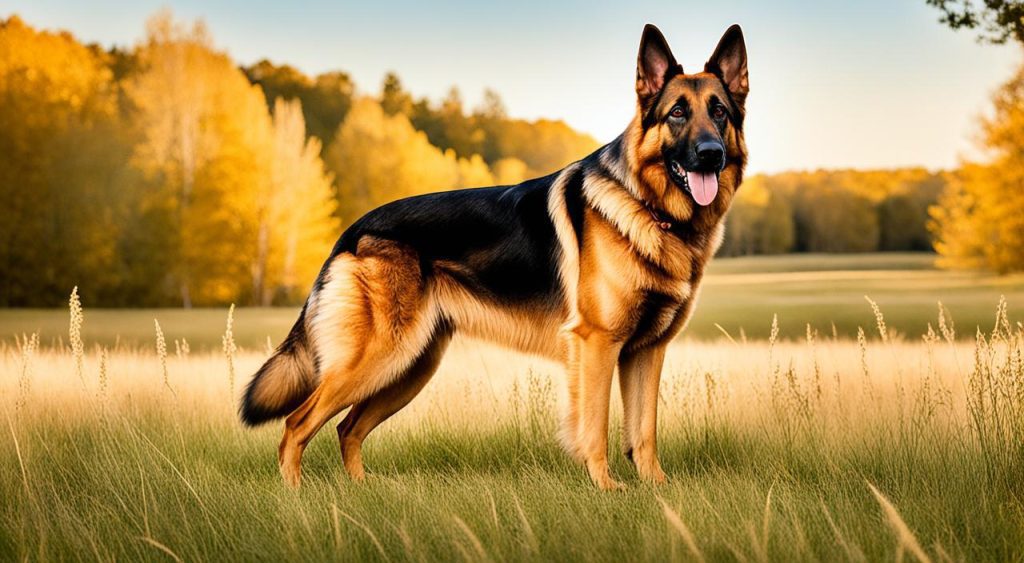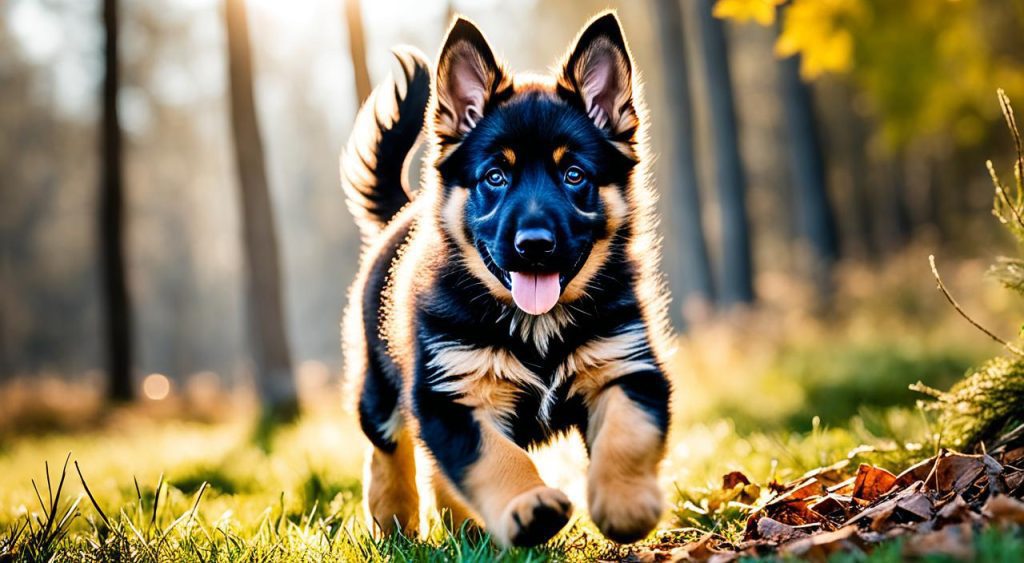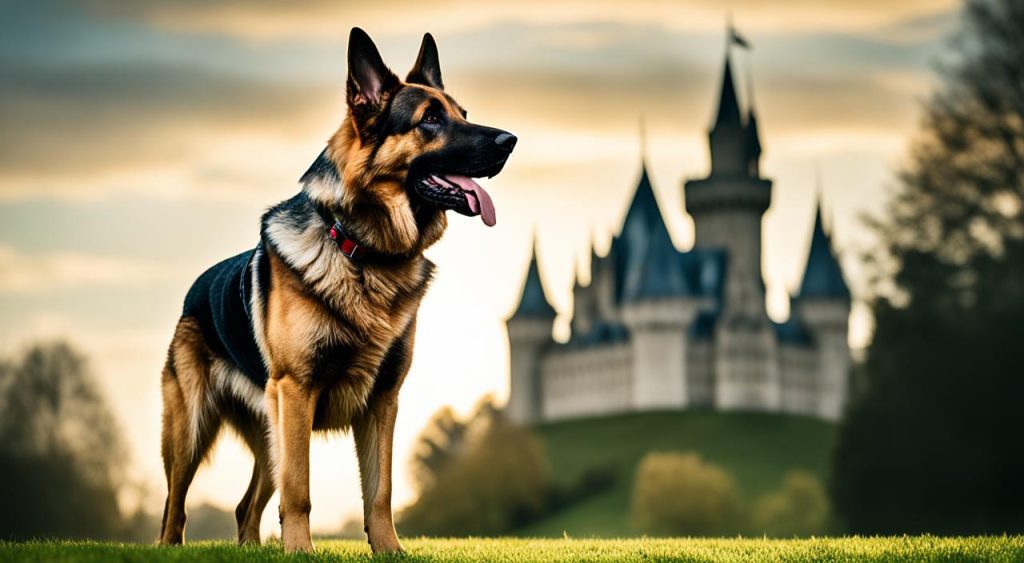As a proud owner of a Sable German Shepherd, I can say these dogs are truly special. They stand out with their beautiful looks and strong loyalty. These dogs are loved for their unique coat colors and their ability to be great companions through good and bad times.
The sable German Shepherd’s coat shows their inner beauty and loyalty, catching the eye of many. Their looks prove the breed’s genetic variety and the hard work of breeders. Learn about the world of sable German Shepherds and why they’re amazing pets.
The Captivating World of Sable German Shepherds
Sable German Shepherds are truly a sight to see, winning the hearts of dog lovers everywhere. They stand out with their unique coat colors, from light silver to deep black. Their striking looks and loyal nature make them a favorite, known for their versatility and companionship.
Key Takeaways
- Sable German Shepherds typically range in height from 22 to 26 inches and weigh between 50 to 90 pounds, with males being larger than females.
- These dogs are moderate to heavy shedders, requiring regular grooming to maintain their beautiful coats.
- Sable German Shepherds come in a variety of color variations, including black sables, silver sables, light sables, dark sables, and golden sables.
- Sable German Shepherds are known for their loyal, intelligent, and protective nature, making them excellent family companions, guard dogs, and working dogs.
- Proper training and socialization are crucial to prevent dominant behavior in sable German Shepherds.
- Common health issues for sable German Shepherds include hip and elbow dysplasia, bloat, and allergies.
The sable German Shepherd’s captivating look is just the start. They are smart, loyal, and devoted, making them ideal for those looking for a true friend and guardian. Explore the world of sable German Shepherds and discover their unique charm.

“The Sable German Shepherd is a true reflection of the breed’s rich history and unparalleled versatility. Their stunning coats and loyal temperament make them a cherished companion for those who appreciate the beauty and strength of this iconic breed.”
The Unique Beauty of the Sable German Shepherd Coat
The sable German Shepherd coat is a true marvel, captivating onlookers with its mesmerizing and dynamic appearance. Unlike other German Shepherd varieties, the sable coat is a mix of light and dark tones. This creates a unique pattern that stands out.
Understanding the Sable Coat Coloration
The sable German Shepherd’s striking look comes from complex genetics. Each hair on the sable coat shows different colors, from light tan to deep mahogany. This mix of pigments leads to a stunning variety of shades and patterns on the dog’s fur.
Sable German Shepherd Genetics and Inheritance
The sable coat in German Shepherds is mainly due to genetics. The sable gene, which causes this coloration, is dominant. So, just one copy of the sable gene can bring out the sable look, making it popular among fans of the breed.
Comparison With Other German Shepherd Color Varieties
The sable German Shepherd is known for its elegance, but the breed has a wide range of coat colors. From bold black and tan to striking bi-color, each variety has its own charm. By looking at these colors, we see the amazing variety that makes German Shepherds so visually appealing.

“The sable German Shepherd’s coat is a true work of art, blending light and dark tones to create a mesmerizing pattern that captivates all who behold it.”
Puppy Development: From Birth to Sable Splendor
Sable German Shepherd puppies start an exciting journey as their coats change from light to the beautiful sable pattern we adore. These adorable pups have a soft, fluffy coat that darkens over time. This shows the unique shades and designs of the sable variety.
Stages of Coat Color Evolution in Puppies
At birth, sable German Shepherd puppies have a light, cream-colored coat. As they grow, their fur’s pigment cells start to work, making the coat darker. This change can take several months, with the puppy’s coat going through various shades before it becomes the distinctive sable pattern.
Recognizing a Sable German Shepherd Puppy
It’s easy to spot a sable German Shepherd puppy once you know what to look for. They usually have a light base color with dark-tipped hairs, giving a shaded or “sabled” look. Their coat may show red, tan, or gray tones, with darker hairs often on the back, legs, and face.
The Importance of Early Socialization and Training
Starting a sable German Shepherd puppy right is key for their growth and happiness. These smart and lively pups do well with early socialization and consistent training. By exposing them to different people, places, and situations early, you can help them become confident and well-adjusted companions.
Spending time teaching sable German Shepherd puppies basic commands and good behavior with positive reinforcement is beneficial. Teaching them the right habits early ensures they’ll be happy and well-behaved sable shepherds throughout their lives.

History and Origin of the Sable German Shepherd
The story of the sable German Shepherd starts in Germany. It’s linked to the creation of the German Shepherd breed. In the late 1800s, Captain Max von Stephanitz wanted to make the perfect working dog. He aimed to create a dog that could do many jobs, from herding to rescue work.
The first German Shepherd, named Horand von Grafrath, was sable-coated. His coat had both light and dark hairs, showing the breed’s unique look. Over time, sable German Shepherds became known for their smarts, loyalty, and many talents. They worked as messengers, guards, and heroes in both World Wars.
Now, sable German Shepherds still impress people with their looks and skills. They started in Germany and have become popular pets and working dogs. Their history shows how this breed has left a lasting mark on the world.
“The sable German Shepherd is the purest variation of the shepherd dog family, embodying the breed’s original roots and timeless appeal.”

A Glimpse Into the Temperament of Sable German Shepherds
Sable German Shepherds are known for their great temperament. They make wonderful pets in many homes. They are smart and easy to train, doing well in many activities like agility and search and rescue.
They are very loyal and protective of their families. They love their families deeply and will do anything to keep them safe.
Intelligence and Trainability
Sable German Shepherds are very smart and love to learn. They are quick to understand and follow commands. This makes them perfect for training in many areas.
They enjoy learning new things and doing different activities. They love the challenge and the attention they get.
Loyalty and Protective Instincts
These dogs are very loyal to their families. They form strong bonds and protect their loved ones with all their heart. They are always alert and ready to defend their family.
Their sharp senses and natural instincts make them great guardians. They provide a safe feeling in the home.
Compatibility With Families and Other Pets
Sable German Shepherds are friendly and fit well with families and other pets. With the right training and socialization, they get along with everyone. They are kind and gentle, making them great with other animals.
Their amazing temperament, intelligence, and loyalty make them a special dog. They are devoted to their families and can do many activities. This is why they are a favorite among dog owners.
Choosing Your Sable German Shepherd: Tips and Considerations
Finding the perfect sable German shepherd is both thrilling and challenging. This rare coat color is highly desired by dog lovers. Here are some important tips to help you choose the right sable dog.
Selecting a Responsible Breeder
Start by finding a trustworthy sable German shepherd breeder. A good breeder focuses on their dogs’ health, behavior, and happiness. They should be open about the breed’s history and health issues. Do your homework, ask lots of questions, and check out their place to make sure they’re a good choice.
Health Screenings and Guarantees
Make sure the sable German shepherd puppy you choose has had all the necessary health checks. A good breeder will show you proof of tests for hips, elbows, and genetic problems like myelopathy. Also, look for breeders who offer health guarantees to protect your new pet.
Meeting Your Potential Sable Companion
When you visit the breeder, spend time with the sable German shepherd puppies. Watch how they act, their energy levels, and how they handle being touched. This will tell you a lot about their personality and if they’ll fit well with your family.
Remember these tips and choose a sable German shepherd from a reputable breeder. You’ll be getting a smart, loyal, and beautiful dog to join your family.
“The sable German shepherd is a true gem in the canine world, combining a captivating appearance with a remarkable temperament.”
Exercise Requirements for the Sable German Shepherd
The sable German Shepherd is an energetic and athletic breed. They need lots of exercise to stay happy and healthy. They do best with a routine that keeps them active.
These dogs love to move and need different kinds of exercises every day. They should go for walks or runs that last 30 minutes to an hour. This helps them stay fit and keeps their minds sharp by letting them explore and meet other dogs.
But walks and runs aren’t enough. Sable German Shepherds also enjoy hiking, swimming, and playing fetch. These activities keep them in top shape and stop them from getting bored.
It’s important to keep their minds busy too. Toys, obedience training, and dog sports like agility or tracking are great for this. They help prevent bad behavior and make your bond stronger.
Being consistent with exercise is important for your sable German Shepherd. Try to give them 60-90 minutes of activity each day. Adjust this based on their age, energy level, and health. This way, you’ll keep them happy and well-adjusted.
“A tired German Shepherd is a good German Shepherd. Providing ample exercise is essential for their physical and mental well-being.”
Grooming Needs of the Sable German Shepherd
Keeping the sable German Shepherd’s coat looking great requires regular grooming. These smart and loyal dogs have a thick double coat. It’s important to take good care of it to keep them healthy and looking good. Proper grooming not only makes them look beautiful but also helps their overall health.
Brushing is key for sable German Shepherds. It gets rid of loose hair, stops mats, and spreads their natural oils around. Breeders suggest using a Furminator brush. Some owners brush their sable GSDs every week, especially if they’re being shown.
Bathing your sable German Shepherd should be rare, as it can take away their natural oils and cause skin problems. Experts say to bathe them only once or twice a year. Regular brushing keeps their coat clean. A good diet also affects how much they shed, so watch what you feed them.
Trimming their nails is also important for grooming. How often you need to trim depends on where they walk. Dogs walking on hard surfaces need less trimming. It’s key to keep their nails trimmed to avoid pain and problems.
Keeping their ears and teeth clean is also vital. Cleaning their ears stops infections. Using special products helps keep their teeth healthy. Talking to your vet can help you find the best grooming routine for your sable.
By spending time on grooming your sable German Shepherd, you keep them looking great and feeling well. Taking care of their coat, nails, ears, and teeth keeps them happy and healthy. Your sable friend will thank you for it.
Understanding Sable Coat Color Genetics
The sable coat of the German Shepherd is a result of complex genetics. It’s all thanks to the agouti gene sequence. This gene is key in mixing black and red pigments in the fur. It makes the sable coat look unique and shaded.
Sable German Shepherds come in many colors, from light silver to deep mahogany. These different shades show how complex the genetics are. Breeders need to know about these patterns to get the right sable colors in their puppies.
Sable German Shepherds are less common in working lines but loved in show lines. The saddle pattern is especially popular. In the U.S., “sable” is used, but in Germany, it’s called “grau” (gray). This shows how different countries see canine coat colors.
| Sable Coat Variations | Genetic Factors |
|---|---|
| Dark Sable | Increased black pigment distribution |
| Light Sable | Higher concentration of red pigment |
| Silver Sable | Dilution of both black and red pigments |
| Bicolor Sable | Specific genetic patterns that create a two-tone effect |
Exploring the genetics of the sable coat is fascinating. It shows how each sable German Shepherd is unique. Whether you’re a breeder, enthusiast, or just love the breed’s looks, learning about sable coat genetics is rewarding. It helps you appreciate these amazing dogs more.
Physical Characteristics of German Shepherd Sable Varieties
The sable coat of a German Shepherd is more than just one color. It’s a mix of colors that makes each dog unique. This mix creates different types of sable German Shepherds.
Black Sable German Shepherd
The black sable German Shepherd has a deep, dark coat. The fur is black at the tips and can be light grey or charcoal at the base. This mix of colors makes them stand out.
Red Sable German Shepherd
The red sable German Shepherd has a reddish base with black tips. This gives it a warm, glowing look. It shows the breed’s genetic diversity and beauty.
Dark Sable German Shepherd
The dark sable German Shepherd’s coat is mostly black. But, it still has the sable banding throughout. This adds elegance and sophistication to their look.
Silver Sable German Shepherd
The silver sable German Shepherd has a coat that shines with a silvery sheen. It has a pale base color with black tips. This mix of colors makes them visually stunning.
Each sable German Shepherd, whether black, red, dark, or silver, shows the breed’s genetic diversity. Their sable coats are captivating and loved by many around the world.
Standard line German Shepherds focus on looks and shape. Working line German Shepherds are bred for their performance. Breeders work to create the right sable colors by understanding genetics.
There are different sable German Shepherds, like black, red, dark, and silver. Each has a unique color mix, from deep black to warm reds and silvery sheens. These dogs are loyal, smart, adaptable, and protective. They’re great for police or service work.
Sable German Shepherd Temperament and Behavior
The sable German Shepherd temperament combines their history as shepherds, protectors, and companions. They are known for their loyalty and smarts. These traits make them great in many roles.
They are hard workers and can fit into many settings. They are confident but not usually aggressive. Their smarts help them learn quickly, which is useful at home and work.
Sable German Shepherds are protective but gentle with their families. They make great guard dogs with the right training. They can do well in police or service work. Each dog is different, but a well-trained sable German Shepherd gets along with people and pets.
These dogs have a lot of energy and a strong protective nature. They’re good for jobs like fieldwork, service, and protection. Owners need to know how to care for and train them. Sable German Shepherds are smart, loyal, adaptable, and protective.
FAQ
What is a sable German Shepherd?
The sable German Shepherd is a stunning variety of the German Shepherd breed. It’s known for its rich, multi-toned coat. This coat shows the dog’s inner beauty and loyalty.
What makes the sable German Shepherd coat unique?
The sable German Shepherd’s coat has a mix of colors. Light and dark hues create a beautiful, shaded pattern. This look comes from specific genes that control fur pigments.
How do sable German Shepherd puppies change in appearance?
Sable German Shepherd puppies change a lot in their early life. They start with a light coat that darkens as they grow. This change shows the puppy’s sable pattern as pigment cells work better.
What is the history and origin of the sable German Shepherd?
The sable German Shepherd came from Germany. The breed’s first dog, Horand von Grafrath, had a sable coat. These dogs were used for herding and saving lives in World Wars I and II. They showed their loyalty and versatility.
What is the temperament of sable German Shepherds?
Sable German Shepherds are smart, easy to train, and very loyal. They make great companions. They’re confident and gentle with families but also protect them well.
How should I choose a sable German Shepherd?
Choosing a sable German Shepherd means finding a responsible breeder. Look for one who focuses on the dog’s health, temperament, and well-being. Check for health screenings, the breeder’s reputation, and meeting the puppy.
What are the exercise and grooming needs of sable German Shepherds?
Sable German Shepherds need regular exercise for their body and mind. This includes daily walks, hikes, or dog sports. They also need proper grooming like brushing and occasional baths to keep their coat beautiful and healthy.
What is the genetic basis for the sable coat in German Shepherds?
The sable color in German Shepherds comes from complex genes. The agouti gene plays a big part. It spreads black and red pigments in the fur, making the sable pattern.
What are the different types of sable German Shepherds?
There are many types of sable German Shepherds. These include black sable, red sable, dark sable, and silver sable. Each type has its own unique coat colors and shades.
How does the sable German Shepherd’s temperament compare to other color varieties?
Sable German Shepherds are smart, trainable, loyal, and protective. These traits are common in the breed, no matter the coat color. Temperaments can vary, but these are typical for sable German Shepherds.




